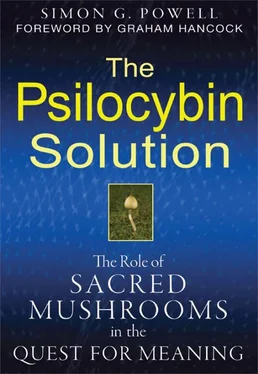Ultimately, the choice about the significance one attaches to the Universe is a personal one. One can only mull over the facts about reality, the rules of the game as it were, and then interpret them in the light of contemplation. One’s unique life experiences will also help shape one’s conclusions about the nature of reality. If you tend to notice and be awed by beauty and purpose within Nature wherever you might care to look, you are perhaps more likely to be dissatisfied with brute-factual explanations. What I have tried to highlight is the sheer fantastic nature of reality, for Nature deserves this at the very least. For my part, I side with Davies. There is most definitely something fishy going on both in and around us. What is more, this fishiness is very subtle and mystifying. And an immense source of wonder.
At the end of The Mind of God, Davies sticks his neck out and suggests that one cannot get at the ultimate meaning of reality by logical and rational thought alone. These are brave words coming from a respectable scientist with an award-winning reputation to defend. And Davies knows that an appeal to other forms of thought for ascertaining answers to the “why” of the Universe is controversial, to say the least. He writes:
Although many metaphysical and theistic theories seem contrived or childish, they are not obviously more absurd than the belief that the universe exists, and exists in the form it does, reasonlessly. It seems at least worth trying to construct a metaphysical theory that reduces some of the arbitrariness of the world. But in the end a rational explanation for the world in the sense of a closed and complete system of logical truths is almost certainly impossible…. If we wish to progress beyond, we have to embrace a different concept of “understanding” from that of rational explanation. Possibly the mystical path is a way to such an understanding. {41} 41 6. Ibid., 231.
There ends Davies’ exploration of God’s mind. Whatever one concludes about the fine-tuning of the Universe, there will always be some factor involved that cannot be grasped by our normal conception since the factor in question is uncaused. If we side with the clumsy and arguably nutty multiple-Universe scenario, we must admit that the infinite multitude of Universes were not caused by anything, that they just are, were, and always will be. And if, like me, you opt for just this one remarkable Universe, there is still the matter of the initial setup, which also indicates some uncaused factor. In other words, there must always have been a timeless and eternal “something” that existed. A chain of causes and effects cannot be extended back in time indefinitely because time itself is believed to have had a beginning. Even if we smugly assume that the Universe sprang out of “nothing,” a potential of some kind, quantum or otherwise, must have always existed . In fact, such a potential must be the richest and most powerful potential imaginable, as it gave rise to everything! Thus, however we look at things, we have no choice but to invoke an eternal something that cannot be explained in terms of something else. One cannot escape this disturbing yet mildly innervating conclusion.
A Return to Entheogenic Wisdom
If we want answers to these most difficult questions, we need to be armed with new forms of consciousness. Our normal frames of thought cannot cope with notions of eternity and the like. And here we must once more face up to the potential power of Nature’s entheogenic allies in elucidating the living mystery of existence. The knowledge attained during the entheogenic experience as well as the revelatory insights gained through superconscious perception of the world arguably represent the most direct path to the kind of metaphysical understanding alluded to by Davies. As far as I am aware, Davies is not clued in to the epistemological virtues of visionary agents, for he explicitly states that he has never had a mystical experience. Open-minded scientists like himself would therefore do well to explore natural entheogens like the psilocybin mushroom, since their numinous effects are in the here and now and not limited to the pages of mystical religious literature.
Psilocybin can potentiate new and enhanced states of consciousness, and it is precisely in such a state that one may glimpse an answer or two to the riddle of reality. Of course, if you are happy with a simple god scenario in which an omnipotent being just sits around studying its creation and maybe dabbling with it now and again, then good for you. However, many of us will want to pursue the mystery in more depth, hoping to attain some deeper and less supernatural insight into the nature of reality. Without doubt, psilocybin can be utilized in this noble and justified pursuit. Entheogens work, just as mathematics works. And it is precisely because they do work and because they do allow one to confront big truths that they elicit fear and mistrust in the West. Indeed, as McKenna attested in his book The Archaic Revival, much of the New Age movement—ostensibly a movement devoted to forging spiritual awareness—is actually a move away from Nature’s psychedelic dimension.
People love seeking answers. If you were to suggest to people that the time of seeking is over and that the chore is now to face the answer, that’s more of a challenge! Anyone can sweep up around the ashram for a dozen years while congratulating themselves that they are following Baba into enlightenment. It takes courage to take psychedelics— real courage . Your stomach clenches, your palms grow damp, because you realize this is real—this is going to work. Not in twelve years, not in twenty years, but in an hour! What I see in the whole spiritual enterprise is a great number of people supporting themselves in one way or another on the basis of their lack of success. Were they ever to succeed, these enterprises would all be put out of business. But no one’s in a hurry for that. {42} 42 7. McKenna, The Archaic Revival, 246–47.
A somewhat harsh evaluation, perhaps, but the point is taken. We are so immersed in the hypnotic spell of our material culture that we are unaccustomed to forms of perception and conception in which our normal frames of reference fade into obscurity. In the innervating and inspirational glow of the psilocybin experience, we suddenly find ourselves transported to a spiritually charged realm where metaphysical musing and theological speculation all but dissolve, giving way instead to a direct perception of the Other, an Overmind, or biospherical mind, that somehow holds the keys to the purpose of life and consciousness.
With the continued emergence of information relating to the psilocybin experience, we now have a raised platform upon which to stand to further our understanding of the nature of reality and consciousness. Just as Newton claimed to have stood on the shoulders of giants to discern more clearly the nature of the Universe, we have reached the point in our culture where we can relaunch the shamanic spirit now vanishing from the rainforests of the Amazon and use it to blaze a trail into the depths of the mystery of our existence. Psychedelic agents, especially the fungal variety indigenous to most regions of the biosphere, can yield knowledge otherwise unobtainable through traditional modes of perception and conception. Herein lies their greatest virtue. Until we make full use of Nature’s ambient psychedelic resources, our understanding of reality will remain incomplete.

We have seen how the Universe is a kind of ongoing utterance, or self-writing story, built upon the language-like integration of information; that information is everywhere being organized; and that consciousness is itself a “finer” form of information arising from the web of informing relationships converging in the neuronal architecture of the brain. Thus we are like playing pieces in a universal game of chess, pieces whose function, role, and meaning are determined according to our relationship to all else. And, in our attempt to apprehend this computational game, we have reached the point where we wonder at the ultimate software whose rules govern the field of play.
Читать дальше











